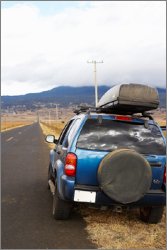What to Do (and Not Do) if Your
Car Ever Leaves You Stranded
by www.SixWise.com
Getting stranded is something that no one expects as they
head off for work, a road trip or just to run a few errands.
But millions of motorists become stranded every year, and
knowing what to do in this emergency situation is a must.
|

If you're stranded, assess whether it's safe to walk
for help. If the road is too busy, or you're too far
from help, you're usually best off staying near your
car.
|
Among the many factors that can leave your car stranded are:
-
Running out of gas
-
A dead battery
-
A flat tire
-
Getting stuck in mud, grass, etc.
-
Bad weather (ice, snow, heavy rain)
-
Losing your keys
-
Other mechanical problems
The steps you should take to keep yourself safe in any one
of these situations are largely dependent on the situation.
Here are some of the more common ones.
What to do if You're Stranded on an Interstate, Highway
or Major Road
If your car breaks down on a busy road, try to pull off to
the shoulder or exit the highway all together. If your car
gets stranded near busy traffic, you should assess whether
you can safely leave the car. If traffic is not too heavy,
get out of the car and wait safely away from traffic (but
keep the car within view). This protects you if another vehicle
strikes your stranded car.
However, before leaving your vehicle you should:
-
Raise your hood and tie something to the radio antenna
or door handle, or hang it out a window. Turn on your
hazard lights. This alerts police officers that you need
help.
-
If you have a cell phone, call the police (or your vehicle
roadside assistance service) and tell them you're stranded.
-
If you are waiting inside the vehicle, lock all the doors.
If someone approaches, roll the window down only slightly
and ask them to phone the police for you. Do not get in
a stranger's car or get out of your car to talk to a stranger.
-
Assess whether you can walk for help. Some interstates
have emergency phones every few miles, or a gas station
may be within walking distance. However, use extreme caution
if you decide to walk near a busy roadway, and don't attempt
to cross a busy, multi-lane highway.
-
If you think you have a flat tire, do not attempt to
change it near a busy road. You could be struck by a moving
vehicle. If you are able to pull far away from the road,
then you could attempt to change it. Otherwise, you're
better off ruining the tire and rim to drive to a nearby
gas station than risk your life changing it near fast-moving
vehicles.
Finally, all interstates, highways and major roads are patrolled
regularly. Once you have put out your distress signals, wait
for a uniformed police officer or other emergency personnel
to arrive to help.
|

If your car breaks down, raise the hood, turn on your
hazard lights and tie a cloth to your antenna (or hang
it out your window). This will alert emergency personnel
that you need help.
|
What to Do if You're Stranded in a Blizzard
If your vehicle gets stuck
in a blizzard, the Denver Office of Emergency Management
offers these tips:
-
Stay in your vehicle.
-
If you have a cell phone, call the police for help, but
be careful not to run down your battery if you can't get
through.
-
If you have an emergency
kit, use supplies conservatively.
-
Attach something to your antenna or window, and leave
your dome light on at night to alert emergency personnel.
-
Check your tailpipe occasionally to make sure it's not
blocked with snow. Clean the pipe out if necessary to
avoid carbon monoxide poisoning.
-
Run the heater for about 10 minutes every hour, depending
on how much fuel you have.
-
Leave a window cracked to let in air, and also to prevent
the car from becoming sealed from heavy ice and snow.
-
Don't sleep if you can help it, especially if the engine
is running and you are alone.
-
Move your arms and legs periodically to keep your circulation
going.
-
Once the storm passes, try writing "HELP" in
large letters in the snow outside your vehicle.
Or in a Flood ...
You should never attempt to drive through standing water,
as it takes just two feet of water to move a car, and it is
very difficult to gauge how deep water is from looking at
it.
However, if you become stranded in a flooded area ...
-
Open your windows so you have a way to get out of your
car, if necessary.
-
Stay in your car unless it is sinking.
-
Use your cell phone to call for help, and put out emergency
signals (hazard lights, hang a cloth out the window).
-
Wait for help to arrive. If you must leave your car because
it's sinking, and the area is flooded, swim to a tree
or something sturdy nearby that you can hold on to.
Most importantly, no matter where you are stranded remember
to stay calm and think logically before making any decisions.
Typically, your best option is to stay in or near your car
and wait for help to arrive, but you must use your best judgment
that takes into account the specifics of the situation.
Recommended Reading
What
Colors Should Police Cars, Ambulances and Fire Trucks Be?
(Hint on Fire Trucks: NOT Red)
What
to Do & Know if You Are in an Auto Accident (Includes
a Checklist Everyone Should Print Out)
Sources
Denver
Office of Emergency Management
AAA
Newsroom